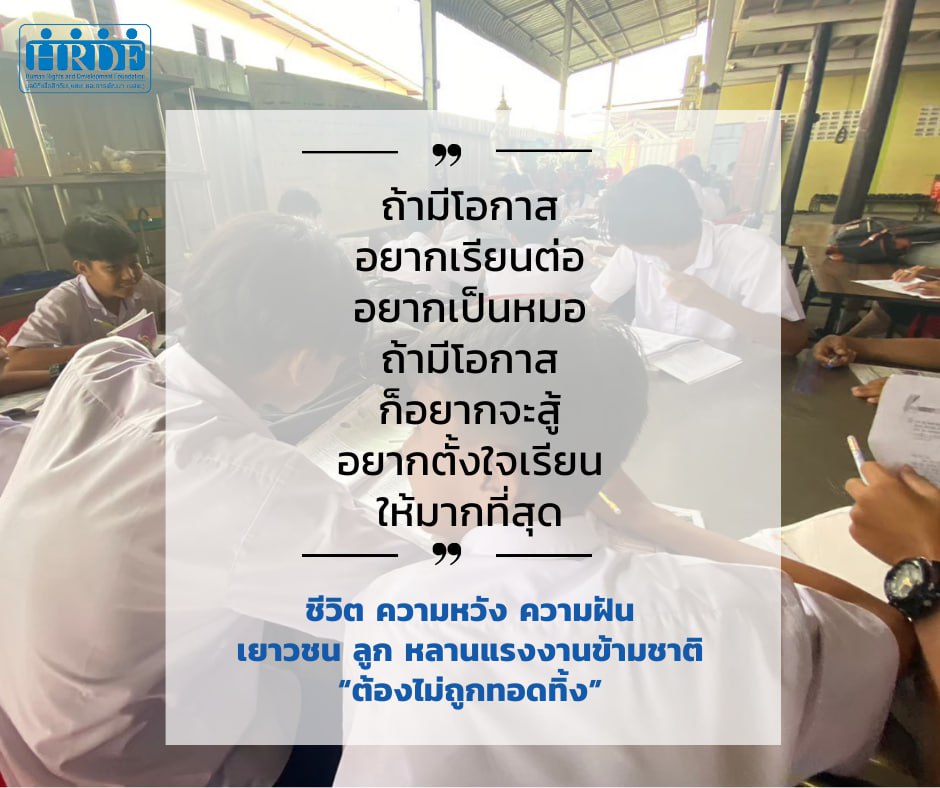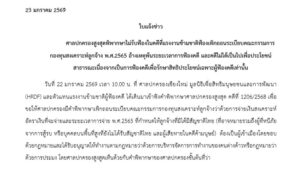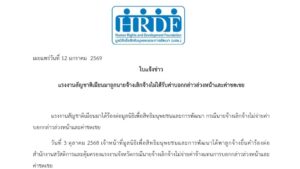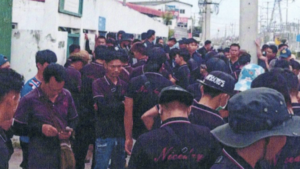
Thailand is currently grappling with a labor shortage, particularly in occupations requiring specialized skills, commonly referred to as the 3D types of work: difficult, dirty, and dangerous. Local workers often eschew these roles, leading some to seek employment opportunities abroad. Consequently, it is imperative to foster a supportive environment for migrant workers, who play a pivotal role in driving the nation’s economy.
However, it is essential not to overlook the hopes and dreams of migrant workers, which are pivotal for the countries and their own future. Migrant workers hope to enhance their quality of life through skill improvement and access to education. Regrettably, there is a glaring lack of attention to the welfare of migrant children in Thailand.
“Migrants must not be abandoned.” Following this, the inquiry arises: What are the living circumstances of migrant workers, encompassing not only adults but also youth, children, and grandchildren? When does one depart from their hometown to seek employment opportunities in Thailand, propelled by hopes and dreams?
These individuals arrive with “hopes and dreams of establishing a fulfilling family life,” beginning with the hope of a secure job and fair treatment by their employer. Accessing services from government agencies in Thailand is seen to enhance their family’s well-being. A significant portion of Thailand’s migrant workforce hails from Myanmar, often accompanied by their children and elderly parents. Alternatively, some choose to work in Thailand initially, later starting families and laying down roots in the country.
When discussing the situation concerning the youths, children, and grandchildren of migrant workers, a significant issue emerges: the lack of Thai nationality. Presently, an estimated 250,000–300,000 individuals in Thailand are unable to access quality education due to their citizenship status. Despite governmental efforts to promote education for all children regardless of nationality, approximately 75 percent of these children still face barriers to accessing state-provided education on an equitable basis (Thai Health Promotion Foundation, 2024).
These challenges profoundly impact the offspring of migrant workers. Civil society encounters instances where parents may resort to sending their children to work to supplement their family income, exacerbating the problem. It is crucial to recognize the potential detrimental effects on children, including physical and mental strain and hindrances to their education, emotional, and social development. Children deserve the opportunity to learn and grow in a conducive and secure environment.
“Child labor” or the involvement of minors in the workforce is unacceptable, as it exposes them to exploitation and risks their well-being. Social progress hinges on government policies that carefully consider both the direct and indirect effects on children. It’s imperative to prevent the exploitation of child labor and safeguard children’s security and development.
In such circumstances, seeking support and guidance from an agency specializing in “preventing risks associated with child labor” is crucial. This includes raising awareness and promoting a proper understanding of children’s rights. Collaborative efforts involving institutions, families, educational establishments, and social welfare agencies are vital for safeguarding the well-being of children and families affected by child labor. By working together, we can bolster children’s resilience and provide them with better opportunities for development, ensuring a brighter future in the long term.
The youth, children, and grandchildren of migrant workers constitute a significant demographic, despite their tender age. They represent a pivotal force in driving the country’s future development, possessing immense potential to contribute to a sustainable future through their creativity, adaptability, and learning abilities. Ensuring the provision of appropriate rights and support to migrant children is thus paramount to establishing a conducive and secure environment for their growth and facilitating their active participation in the nation’s advancement. Such endeavors yield mutual benefits in the long run.
During a conversation with Aye Mar Cho, a coordinator from the Human Rights and Development Foundation (HRDF), Mahachai area, Samut Sakhon Province, insights into the challenges faced by many youths, children, and grandchildren of migrant workers unfolded. These individuals often lack access to further education and may find themselves living in cramped accommodations while their Thai counterparts attend school. Some families resort to sending these children to work due to the absence of appropriate and safe educational opportunities, exposing them to exploitation, including the risk of human trafficking. Consequently, Aye Mar Cho advocates for the establishment of learning centers tailored to the needs of migrant workers’ children.
Aye Mar Cho’s perspective on the pressing need for a learning center for migrant children underscores the significance of providing educational opportunities to all children. She advocates for comprehensive development and knowledge acquisition, emphasizing that being born to migrant workers doesn’t dictate one’s future profession. Instead, she envisions migrant children flourishing in various fields, contributing to Thailand’s and any nation’s prosperity as competent citizens. Thus, education is seen as a catalyst for enhancing both individual lives and the nation’s welfare.
The youth, children, and grandchildren of migrant workers, whether accompanying their parents to Thailand or born within the country, constitute a demographic deserving of quality education. However, they encounter challenges in obtaining the essential identification documents necessary for accessing Thailand’s education system. Many Thai schools impose strict document requirements, hindering migrant children’s enrollment despite governmental policies advocating equal access to education.
Field interviews have revealed that children born to Myanmar migrants living in Thailand with their families encounter challenges in obtaining documents such as dependent cards. Consequently, these children are unable to access Thailand’s education system as intended, in contradiction to the government’s policy advocating for equal access to quality education without barriers for all.
. Subsequently, civil society endeavored to collaborate with various sectors to establish learning centers catering to the youth, children, and grandchildren of migrant workers. Support for constructing school buildings was garnered from temples, communities, and private sector entities, alongside the cooperation of parent’s keen on ensuring their children’s access to education. Encouragingly, there was notable interest among migrant children, with volunteers stepping forward to provide educational support. The Migrant Child Learning Center aims to elevate educational standards in alignment with both the Thai Ministry of Education and the education systems of the children’s countries of origin, thus enabling all children to pursue education up to the bachelor’s level.
According to an announcement from the Myanmar Education Agency, children in Grade 4 (Upper elementary school) now have the chance to cross the border and sit for exams in Myanmar through various channels, such as Mae Sot and Kanchanaburi. These exams are specifically designed for Myanmar children studying independently or attending learning centers in Thailand. Encouragingly, it has been reported that children from these learning centers have successfully passed the examinations, meeting the educational standards set by the Myanmar government.
The evolving societal landscape underscores the necessity for continual development amidst persistent challenges. Consequently, parents of migrant workers’ offspring demonstrate a willingness to invest in their children’s education, striving to ensure their access to educational opportunities. Despite lacking government funding, the Migrant Child Learning Center sustains itself through various means, including financial contributions from parents.
Through an inquiry with a volunteer at the Migrant Worker Learning Center, it was revealed that they face challenges in their work. Preparation entails various tasks, such as arranging equipment, developing educational content, and creating learning materials for the children. Despite these difficulties, a volunteer from Myanmar expressed their commitment, stating, “Driven by the desire to provide knowledge, I am determined to ensure children have access to education.” Consequently, the issue of child labor has begun to decline as more migrant worker learning centers emerge across Thailand.
Furthermore, the learning center prioritizes diversity, recognizing the significance of inclusivity beyond gender binaries. Activities are designed to foster collaboration among children of various gender identities, including males, females, and LGBTQ+ individuals, allowing them to participate based on their preferences and abilities. Through initiatives such as dance rehearsals and cultural performances, children are encouraged to express themselves freely, devoid of gender discrimination. These inclusive practices not only showcase the multifaceted talents of children but also provide opportunities for them to showcase their abilities in various settings, with dedicated staff and volunteers ensuring their well-being throughout.
In various locations across Thailand, learning centers have been established to cater to the educational needs of vulnerable groups, including youth, children, and grandchildren of migrant workers. Even in the most challenging and previously overlooked areas, educational opportunities have emerged through the determined efforts of migrant workers and civil society organizations. Their belief in the transformative power of education is underpinned by the conviction that providing educational spaces for children fosters hope, happiness, and a brighter future, thus positively impacting society.
For instance, the inspiring stories of individuals like WIRI YA TUN, THAE WADDY YOON, and MI HTAR WARA KYAI ZIN, who represent the hopes and resilience of migrant worker children, WIRI YA TUN, who dreams of becoming a doctor, shares his journey of studying in both Burma and Thailand, expressing gratitude for the opportunity to continue his education and his determination to give back to Thailand. Similarly, THAE WADDY YOON envisions opening a beauty salon, while MI HTAR WARA KYAI ZIN perseveres through challenges, striving for a brighter future despite the hurdles.
The above statement reflects that these children harbor hope and dreams, which they pursue with determination and perseverance through challenging circumstances. They strive to seize opportunities for education and knowledge, aspiring towards a better future. Looking ahead, the administrator of the Migrant Child Learning Center expressed a desire for the Ministry of Education to prioritize the education of migrant children, recognizing the unique lifestyle of migration as an alternative path. This entails going beyond formal education or its equivalents and acknowledging the diverse needs and circumstances of migrant communities.
Aye Mar Cho, a Burmese worker, recognizes the significance of this mission and tirelessly advocates for the establishment of standardized educational spaces. She views this endeavor as a vital step towards fulfilling the hopes and dreams of children across the nation, believing that quality basic education is fundamental to shaping responsible citizens who will contribute to the country’s development. Through her advocacy, she endeavors to turn the hopes of migrant worker children into reality, empowering them to become agents of positive change in their communities and beyond.
It is evident that migrant workers have made significant contributions to the country, including bolstering knowledge and expertise in areas where there is a shortage of skilled labor and stimulating economic growth through increased domestic production and remittances sent home from abroad. However, despite these contributions, there are lingering issues regarding the rights and recognition afforded to migrant workers.
Challenges such as hostile work environments, prejudice, inadequate legal assistance, and the risk of exploitation or human rights violations persist. Access to essential services like healthcare and education also remains a concern. Addressing these issues necessitates the establishment of a robust framework that maximizes the potential for the growth and development of migrant children.
Collaboration and support from all sectors are essential to creating an inclusive and equitable education system. This includes establishing coordination centers between educational institutions and social welfare agencies and advocating for migrant children to have the opportunity to return to study in their country of origin’s educational system. Such efforts aim to provide equal opportunities and create a conducive environment for the educational advancement of migrant children.
Migrant children should be afforded the same protection and equality as all children in society, irrespective of their status, gender, race, or religion. From a financial perspective, investing public funds in the education and development of migrant children yields long-term social and economic benefits. Ensuring every child’s right to access education without hindrance contributes to a more equitable and prosperous society in the future.
Ultimately, advocating for the establishment of a learning center for child migrants is seen as a pivotal step in expanding educational opportunities and enhancing access to education. Moreover, it supports the sustainable learning and development of migrant children, providing them with a pathway towards realizing their dreams. By instilling the belief in these children that they will become valuable and impactful contributors to the country’s future in a sustainable manner, this initiative lays the groundwork for their long-term success and societal contributions.
The phrase “migrants must not be abandoned” carries profound significance, reflecting a collective responsibility towards humanity. It prompts us to reflect on our readiness to support change for migrant workers, including their youth, children, and grandchildren, without prejudice. By embracing inclusivity and ensuring equal access to education, occupation, and basic welfare, we cultivate mutual respect and foster harmonious relations among all members of society.
The critical question that remains is whether migrant and child workers have truly received the rights and equality they deserve. Addressing this question requires concerted efforts from all sectors of society to dismantle barriers and uphold the principles of fairness for all individuals, regardless of their background or status.



